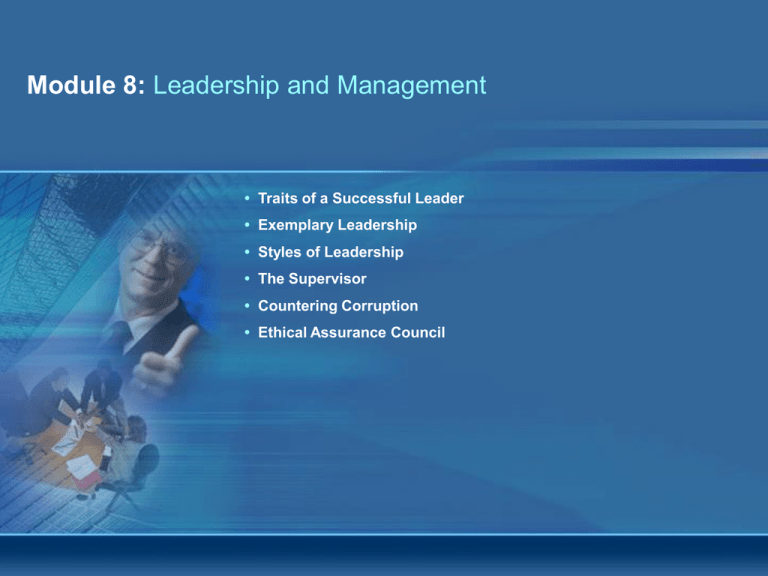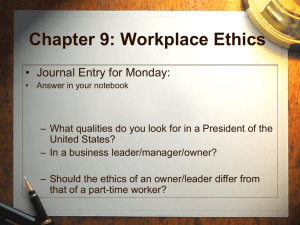CTP Mod8 07 537KB Jan 19 2015 10:34:47 AM
advertisement

Module 8: Leadership and Management Module 8: Leadership and Management • Traits of a Successful Leader • Exemplary Leadership • Styles of Leadership • The Supervisor • Countering Corruption • Ethical Assurance Council Integrity Awareness and Workplace Ethics Workshop Page 1 Module 8: Leadership and Management Traits of a Successful Leader • Conveys a sincere interest in others. • Satisfies the needs of subordinates. • Develops an organizational commitment. • Is honest and open in dealings with fellow employees. • Allows employees to play an active role in decision-making. • Provides challenges and responsibilities for officers. • Conveys trust and understanding. • Assists in the personal development of employees. Integrity Awareness and Workplace Ethics Workshop Page 2 Module 8: Leadership and Management Exemplary Leadership • Is the process through which people: • Motivate Direct Influence Communicate Promotes: Respect Fairness Honesty • Removes obstacles that prevent others from doing their job. • Generates an atmosphere of teamwork, comradeship, and ethical employees. Integrity Awareness and Workplace Ethics Workshop Page 3 Module 8: Leadership and Management The Supervisor • Human Relations • Role Model • Counseling • Motivation • Communication • Training • Evaluation • Source of Knowledge Integrity Awareness and Workplace Ethics Workshop Page 4 Module 8: Leadership and Management Human Relations • Be fair and respectful to all employees. • Assess the need for specific types of leadership. • Identify the skills necessary to perform efficiently. • Develop positive relationships with fellow workers. Integrity Awareness and Workplace Ethics Workshop Page 5 Module 8: Leadership and Management Role Model • Act as trainer, counselor, and mentor for all employees. • Help develop traits in employees such as sincerity, loyalty, honesty, respect, and dedication. Integrity Awareness and Workplace Ethics Workshop Page 6 Module 8: Leadership and Management Counseling • Oversee the counseling process with employees. • Be able to counsel ethically. • Should use positive counseling techniques: • Empathizing Suggesting Referring Reviewing Motivating Clarifying Informing Interpreting Use traits such as friendliness, sincerity, and honesty everyday. Integrity Awareness and Workplace Ethics Workshop Page 7 Module 8: Leadership and Management Motivation • Understand the effect motivation has on employees. • Develop and use motivation strategies that enhance successful performance. • Motivate employees by helping them achieve goals. • Place an emphasis on enriching the work environment. • Create a positive and supportive atmosphere. • Remove obstacles. Integrity Awareness and Workplace Ethics Workshop Page 8 Module 8: Leadership and Management Communication • Possess skills such as reading, listening, and speaking. • Must be able to: • Offer constructive criticism Disagree assertively Listen effectively Summarize the message Confirm a final decision Remember that effective communication is difficult regardless of the situation. Integrity Awareness and Workplace Ethics Workshop Page 9 Module 8: Leadership and Management Training • Need enough instruction skills to effectively teach employees. • Consider a “train-the-trainer” course. Integrity Awareness and Workplace Ethics Workshop Page 10 Module 8: Leadership and Management Evaluation • Able to fairly document and correct improper behavior. • Carry out and communicate “evaluation” on a daily basis. • Record any evaluations in writing. • Allow honesty and respect to guide the evaluation process. Integrity Awareness and Workplace Ethics Workshop Page 11 Module 8: Leadership and Management Knowledge Source • Stay knowledgeable. • Remember that lack of knowledge can discredit the entire organization. Integrity Awareness and Workplace Ethics Workshop Page 12 Module 8: Leadership and Management Countering Corruption • Conduct quality background investigations. • Implement high quality on the job training programs. • Fight political interference. • Insure commitment and accountability. • Conduct ethics training. Integrity Awareness and Workplace Ethics Workshop Page 13 Module 8: Leadership and Management Countering Corruption (cont.) • Provide positive leadership role models. • Prevent victimization. • Implement an effective intervention process. • Make character and role-modeling the highest consideration for promotion. • Acknowledge and resolve integrity needs. Integrity Awareness and Workplace Ethics Workshop Page 14 Module 8: Leadership and Management Conduct Quality Background Investigations • The best predictor of future ethical performance is past behavior. • A hiring process should be centered around high ethical standards. • Thorough background investigations are vital to hiring employees with strong character. • Upper administration will need to demonstrate sincere support and commitment. Integrity Awareness and Workplace Ethics Workshop Page 15 Module 8: Leadership and Management Implement FTO Programs • Ensures that Field Training Officers are not angry and frustrated. • Helps produce a positive organizational culture. • Eliminates all-too-common problems associated with: Poor communication Standardization Selection processes Compensation Support Integrity Awareness and Workplace Ethics Workshop Page 16 Module 8: Leadership and Management Fight Political Interference • Exerts pressure on organizations to: • Hire employees without conducting background investigations. Hire or promote employees for unfair reasons. Can also result in: Unfair salaries. Understaffed and overworked workers. Actions that demoralize employees. An “internal culture” that causes unethical acts. Integrity Awareness and Workplace Ethics Workshop Page 17 Module 8: Leadership and Management Insure Commitment and Accountability • Make sure ethics is presented as a never-ending requirement. • Reward employees for good ethical deeds. • Punish unethical conduct fairly and quickly. • Have consequences clearly written. • Require supervisors to resolve integrity needs. Integrity Awareness and Workplace Ethics Workshop Page 18 Module 8: Leadership and Management Conduct Ethics Training • The Continuum of Compromise. • Common ethical dilemmas. • Facts about bad law enforcement personnel. • Strategies to intervene to save coworkers or peers. • Need for ethical courage. • The Corruption Continuum. Integrity Awareness and Workplace Ethics Workshop Page 19 Module 8: Leadership and Management Provide Positive Leadership Role Models • Instill a sense of pride and tradition through good leadership. • Make sure leaders set a good example for all to follow. • Have leaders back up words with action. • Model the behavior you want to change or influence. • Focus on developing traits such as sincerity, loyalty, honesty, respect, and dedication. Integrity Awareness and Workplace Ethics Workshop Page 20 Module 8: Leadership and Management Prevent Victimization • Officers that perceive themselves as victims often commit a series of progressively worsening unethical behaviors. • Perception of being a victim helps officers rationalize their misconduct. Integrity Awareness and Workplace Ethics Workshop Page 21 Module 8: Leadership and Management Implement an Intervention Process • Have a process that stops unethical behaviors as soon as they are identified. • Use positive peer pressure to reverse the tendency of people to join others unethical conduct. • Provide training for supervisors to make sure they treat all employees fairly. • Use employee performance tracking software. Integrity Awareness and Workplace Ethics Workshop Page 22 Module 8: Leadership and Management Give Character and Role-Modeling High Consideration for Promotion • Supervisors are vital to the future of the agency. • Supervisors are the first line of defense against wrongdoing. • Supervisors must be able to have the courage to stop even minor transgressions. • Supervisors in Customs organizations face additional temptations. Integrity Awareness and Workplace Ethics Workshop Page 23 Module 8: Leadership and Management Acknowledge and Resolve Integrity Needs • Leave a legacy of integrity. • Remember that ethical heroism lies at a much higher level than physical heroism. Integrity Awareness and Workplace Ethics Workshop Page 24 Module 8: Leadership and Management Leadership and the New Orleans Police Department • • • • • • • • • • • • New administrator honestly acknowledged problems. Top leaders demonstrated their commitment to integrity. Corrupt officers were fired. Background investigations were enhanced. Supervisors were made accountable for their actions. Political interference into hiring and need resources was confronted and overcome. Field Training Officer program was vastly improved. Employee intervention process was established. Internal affairs process was greatly improved. Officer promotion and transfer procedures improved. Anger and frustration of employees resolved. Ethics training was conducted. Integrity Awareness and Workplace Ethics Workshop Page 25 Module 8: Leadership and Management Discussion • What techniques can be used to counter corruption – or potential corruption – within your own organization? Integrity Awareness and Workplace Ethics Workshop Page 26 Module 8: Leadership and Management Ethical Assurance Council • Provides guidance and assistance to the ethical improvement process. • Establishes a communication system that causes ethical assurances related information to be shared. Integrity Awareness and Workplace Ethics Workshop Page 27 Module 8: Leadership and Management Goals and Objectives • Develop a council membership comprised of key employees from each division and unit. • Draft a council charter. • Have regular meetings. • Oversee an ethical needs assessment. • Identify and resolve problems related to ethics. • Make ethics a way of life. • Achieve the ethics mission, goals, and objectives. • Document and publish council meetings and actions. Integrity Awareness and Workplace Ethics Workshop Page 28 Module 8: Leadership and Management Role of Supervisors • Coaching about problem-solving. • Providing required resources. • Giving advice on problem-solving. • Coordinating team activities. • Assisting in the implementation of solutions. • Recognizing team achievement. Integrity Awareness and Workplace Ethics Workshop Page 29 Module 8: Leadership and Management Summary and Review • Leadership commitment to change. • Traits of successful supervisors. • Styles of leadership. Autocratic Benevolent Democratic Participative • Roles of supervisors. • Ways to counter corruption. • Ethical assurance council. Integrity Awareness and Workplace Ethics Workshop Page 30








